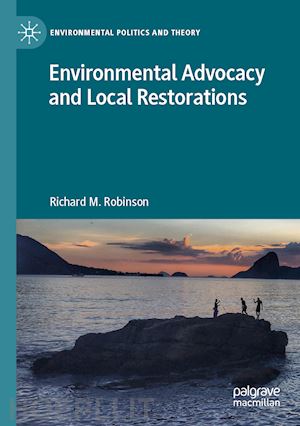

Questo prodotto usufruisce delle SPEDIZIONI GRATIS
selezionando l'opzione Corriere Veloce in fase di ordine.
Pagabile anche con Carta della cultura giovani e del merito, 18App Bonus Cultura e Carta del Docente
This book explores the leadership of state and federal environmental agencies and local environmental groups in restoring the degraded rivers that flow into North America’s Great Lakes and other sites in the northeastern industrial corridor of the US. Robinson examines twenty of the forty-eight sites included in the Areas of Concern Program of the Great Lakes Water Quality Agreement between Canada and the US. These twenty include heavily urbanized locales such as those along the River Rouge and Detroit River, but also more pristine locales such as the St. Louis River that flows through Duluth. Additionally, Robinson examines challenging river restorations within the northeastern industrial corridor which are led by effective local environmental advocacy organizations: the Penobscot Nation of Indigenous People, the Mystic River Watershed Association, and the Housatonic River Valley Association. All of these river restorations are led and managed by the environmental experts of (i) state and federal agencies, (ii) academia, and (iii) environmental NGOs. Local restorations of industrially degraded water bodies now compose a significant segment of the environmental movement and, ultimately, Robinson demonstrates that local environmental advocacy organizations can help marshal state and local funding for those efforts.
Chapter 1: Habitat Restoration: An Introduction.- Chapter 2: A Reasoned Process for Restorations.- Chapter 3: Restoring Areas of Concern.- Chapter 4: The St. Louis River Area of Concern.- Chapter 5: The Wisconsin Department of Natural Resources and Wisconsin’s Areas of Concern.- Chapter 6: The “Most Polluted River”: The Grand Calumet .- Chapter 7: Restoration Sites in Michigan’s Lower Peninsula:Saginaw and Muskegon AOCs.- Chapter 8: Ohio’s Areas of Concern and Citizen Involvement.- Chapter 9: Some Other Important Areas of Concern and Their Analyses.- Chapter 10: Some New England Rivers and Their Advocacy Organizations.- Chapter 11: Conclusion: Some Lessons From Local Restorations.
Richard M. Robinson is Professor of Business at the State University of New York at Fredonia (SUNY Fredonia), USA. He is the author of Environmental Organizations and Reasoned Discourse (2021), Business Ethics: Kant, Virtue, and the Nexus of Duty (2021), and The Imperfect Duties of Management (2018).











Il sito utilizza cookie ed altri strumenti di tracciamento che raccolgono informazioni dal dispositivo dell’utente. Oltre ai cookie tecnici ed analitici aggregati, strettamente necessari per il funzionamento di questo sito web, previo consenso dell’utente possono essere installati cookie di profilazione e marketing e cookie dei social media. Cliccando su “Accetto tutti i cookie” saranno attivate tutte le categorie di cookie. Per accettare solo deterninate categorie di cookie, cliccare invece su “Impostazioni cookie”. Chiudendo il banner o continuando a navigare saranno installati solo cookie tecnici. Per maggiori dettagli, consultare la Cookie Policy.